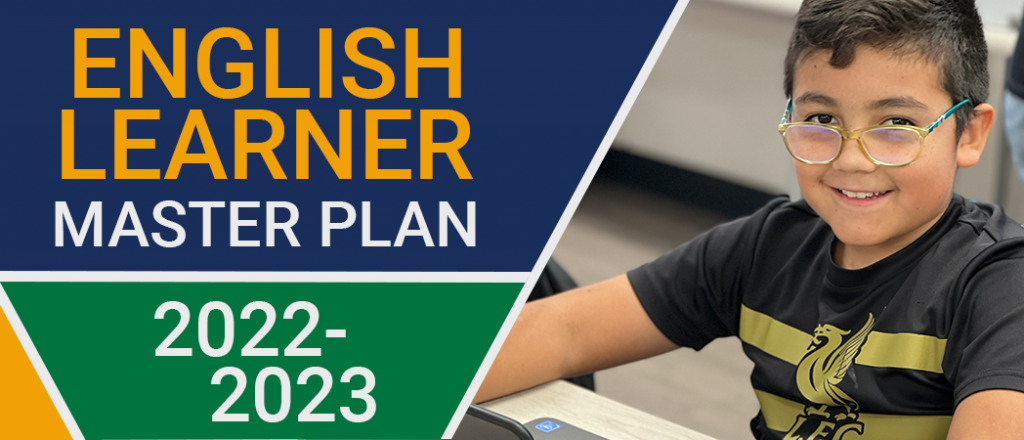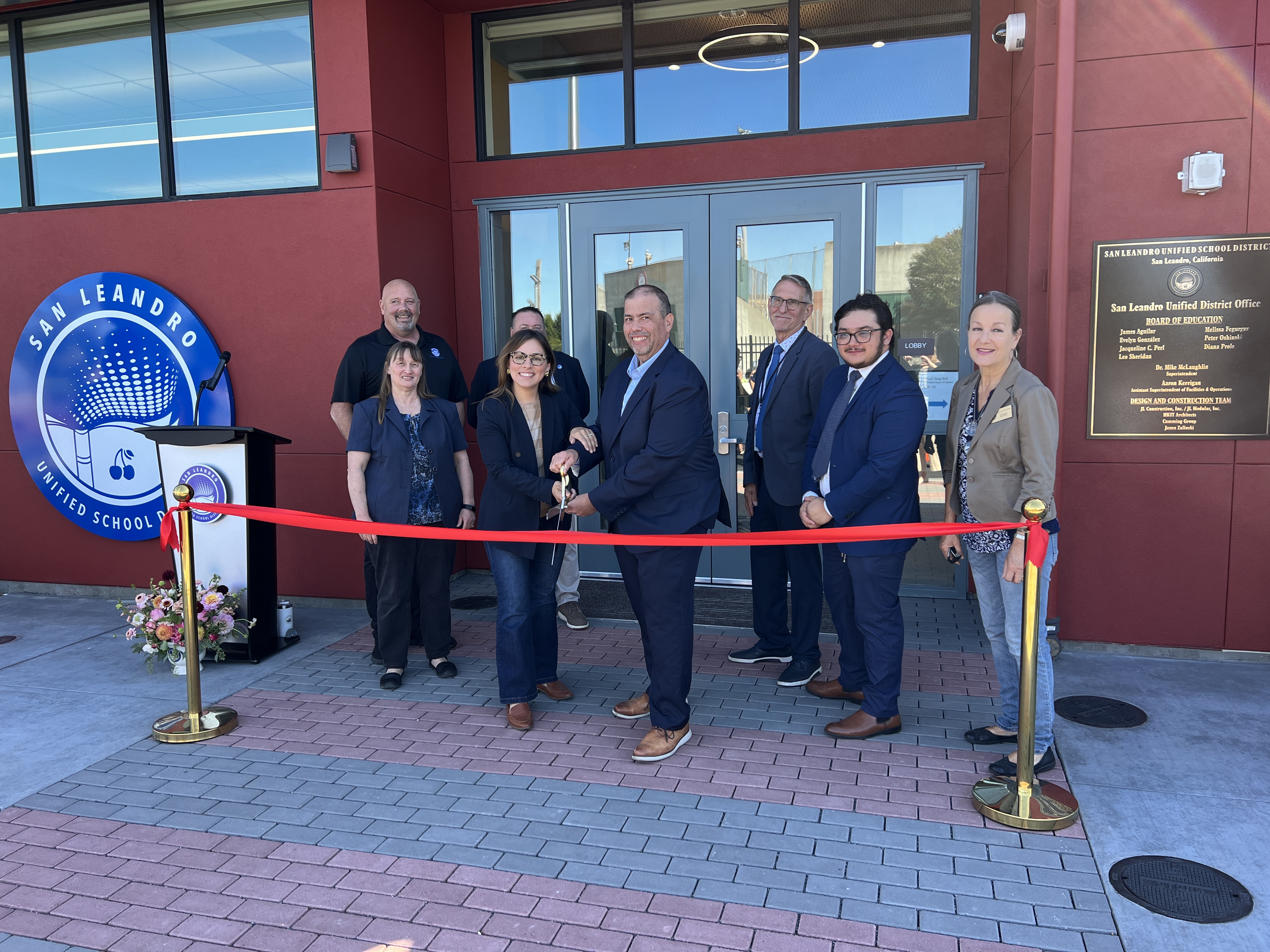
INTRODUCTION
San Leandro Unified School District enrolls English Learners (ELs) in varying concentrations across eight elementary schools, two middle schools, one comprehensive senior high school, one alternative high school and a K-12 San Leandro Virtual Academy. This English Learner Master Plan outlines the systems that are in place in every school to ensure compliance with state and federal law and, more importantly, to guarantee that all ELs in SLUSD have access to rigorous and joyful school experiences to meet the goals of the SLUSD Graduate Profile, graduating as critical thinkers who communicate and collaborate around being ethical and cultural leaders.
SLUSD recognizes that English Learners have a double curricular load. They must become proficient in academic English, and they must master all of the academic content required of all students in California. This means that ELs require additional services to ensure that they acquire English and access the full curriculum in a way that makes instruction comprehensible and meaningful. ELs receive instruction in all core content areas and are provided with additional services to ensure that their linguistic and academic needs are met.
Fluency in academic English is an issue of access, equity, and social justice. SLUSD believes that a student’s education cannot be determined by race, ethnicity, linguistic background, or socioeconomic status. We know these characteristics are strengths that make every student unique. In this plan, we ensure teaching practices and strategies that respect, affirm, and build on the home language and culture and offer families instructional program options.
SLUSD prioritizes multilingualism and pathways toward biliteracy. We believe that we can prepare multilingual students to compete in a diverse global economy while building cross-cultural understandings to address the challenging issues facing our country. That can be done best when they have the opportunity to learn rigorous linguistic, academic, and sociocultural skills and work with people who speak or learn differently than they do. These skills are essential to succeed in our complex, interconnected world. Research has shown that learning two languages while simultaneously learning academic content leads to cognitive advantages for emergent bilingual learners (Marian & Shook, 2012).
San Leandro Unified School District enrolls English Learners (ELs) in varying concentrations across eight elementary schools, two middle schools, one comprehensive senior high school, one alternative high school and a TK-12 San Leandro Virtual Academy. This English Learner Master Plan outlines the systems that are in place in every school to ensure compliance with state and federal law and, more importantly, to guarantee that all ELs in SLUSD have access to rigorous and joyful school experiences to meet the goals of the SLUSD Graduate Profile, graduating as critical thinkers who communicate and collaborate around being ethical and cultural leaders.
SLUSD recognizes that English Learners have a double curricular load. They must become proficient in academic English, and they must master all of the academic content required of all students in California. This means that ELs require additional services to ensure that they acquire English and access the full curriculum in a way that makes instruction comprehensible and meaningful. ELs receive instruction in all core content areas and are provided with additional services to ensure that their linguistic and academic needs are met.
Fluency in academic English is an issue of access, equity, and social justice. SLUSD believes that a student’s education cannot be determined by race, ethnicity, linguistic background, or socioeconomic status. We know these characteristics are strengths that make every student unique. In this plan, we ensure teaching practices and strategies that respect, affirm, and build on the home language and culture and offer families instructional program options.
SLUSD prioritizes multilingualism and pathways toward biliteracy. We believe that we can prepare multilingual students to compete in a diverse global economy while building cross-cultural understandings to address the challenging issues facing our country. That can be done best when they have the opportunity to learn rigorous linguistic, academic, and sociocultural skills and work with people who speak or learn differently than they do. These skills are essential to succeed in our complex, interconnected world. Research has shown that learning two languages while simultaneously learning academic content leads to cognitive advantages for emergent bilingual learners (Marian & Shook, 2012).
We fully embrace the Lau v. Nichols (1974) Supreme Court decision, whose essence was codified into federal law through the Equal Educational Opportunities Act of 1974 (EEOA) Section 1703(f) of this act that declares: “No state shall deny educational opportunities to an individual on account of his or her race, color, sex, or national origin by … (f) the failure of an educational agency to take appropriate action to overcome language barriers that impede equal participation by its students in its instructional programs.”
The passing of California’s Proposition 58, The California Multilingual Education Act, which passed in 2016, supports the idea of English learners being emergent bilinguals that not only learn a second language but also leverage their native language as an asset to their success.
SLUSD recognizes that the key to providing equitable educational opportunities for English learners to meet our goals is to have a clear plan understood and implemented at all layers of our organization.
This updated English Learner Master Plan provides guidance and direction to administrators, teachers, support staff, and families regarding the options available to students and the district’s expectations for each school and classroom. It offers a practical guide for all staff to ensure consistent, coherent services are provided to every English learner in our district. All educators are expected to implement this plan with fidelity and hold each other accountable while continuously improving our services and outcomes.
This Master Plan was developed to ensure that all ELs in SLUSD attain optimal linguistic and academic success. The plan describes the identification of ELs, available program options, and the path to English proficiency through full access to challenging academic curricula. It describes the systems for monitoring student progress from the point of identification through their reclassification to Reclassified Fluent English Proficient (RFEP) status. While reclassification is an important milestone for all ELs, it is not the journey’s end. SLUSD continues to closely monitor the progress of RFEP students who have met reclassification criteria to ensure that they continue to achieve, putting in place appropriate linguistic and academic support as needed.
San Leandro Unified is a culturally rich and linguistically diverse school district. Our students come from vibrant communities that speak over 38 languages. More than a quarter of those students are English Learners. With this in mind, we have the duty and privilege to ensure our multilingual students become proficient in English while also mastering or surpassing the state standards across all content areas.
While many of our learners face significant challenges in learning a new language while meeting their academic goals, we know they bring abundant cultural and linguistic strengths. Our charge is to nurture these abilities as they learn and grow in our schools and community. Our English Learner Master Plan supports this growth with clear, adaptive educational pathways to bilingualism and biliteracy for all our multilingual students.
Effective implementation of this plan requires authentic partnerships with our families and students. Partnerships are built through communication and collaboration, but they are strengthened with love and care. I hope that you will see and feel those values throughout this plan. I encourage you to stay in community with us as we learn more together about what our students need to live their lives with passion and purpose. Thank you for being on this journey with us.
As the Educational Services Division leader, I am proud of the work behind developing, implementing, and refining this rigorous roadmap for our multilingual learners. I want to thank the deeply committed educators and community members for their feedback and labor of love! I know that many hands, hearts, and minds collaborate to foster multilingualism through high-quality programs and services. As a former English language learner, now proudly trilingual (Gujarati, Spanish, English), I value the passion and critical lenses of our staff and community. It takes relentless effort to counter the legacy of monolingualism in public education. I am grateful to be in such tireless company.
We embrace continuous, inquiry-based improvement. This plan offers the refinements and enhancements we believe will better serve our multilingual community. Beyond reclassification and attaining the California State Seal of Biliteracy, our ultimate hope for our multilingual students is to harness the unique strengths and abilities they bring to our classrooms to prepare them for continued success beyond our schools.
This plan, with its compilation of best practices and procedures, is a touchstone for our students and their families. But our continued improvement also depends heavily on our community’s understanding of their role in implementation. I invite you to thoroughly and thoughtfully review this document and share your perspectives as we work together to serve our students.
We acknowledge the dedicated effort and collaboration of the District’s teachers, administrators, staff, parents, and external experts. We thank all who dedicated their time and input in providing feedback that helped guide the contents of the plan and supported the work of the group.
English Learner Master Plan Redesign Work Group 2021-2022
Elementary Teachers:
Yolanda Cater, Maira Gomez, Andres Garcia, Louise Shaw, Elizabeth Shin, Joshua Wood
Secondary Teachers:
Jennifer Achten, Cesar Garcia, Jennifer Jones, Teresa Liao, Kathleen Passmore, Jordan Rodriguez, Lisa Wong
EL Specialists:
Sarah Ansari, Ed.D, Cybelle Camberos
Instructional Coaches:
Sally Barry, Alane Paul Castro (honorary)
DELAC EL Master Plan Sub-Committee
ELAC Site Members
District Technical Staff:
David Mellons
Site Administrators:
Jeannette McNeil, Rebecca Padilla
District Administrators:
Doris Castillo, Joanne Clark, Sonal Patel, Ed.D., Keziah Moss, Zarina Zanipatin, Ed.D
Guiding Principles
The California English Learner Roadmap from the California Department of Education aligns four principles that guide our work to ensure access and achievement for English learners. These principles serve as the vision and the foundation for the collective responsibility we share for our English learners. We have adapted and expanded them for use in SLUSD.

Assets-based Education: Schools and educators foster asset-oriented environments grounded in sociocultural competence.
Each student is valued for the cultural and linguistic capital they bring to the classroom. This not only empowers students and families to develop positive attitudes towards their linguistic and cultural identities but also highlights the benefits of embracing the diversity, biliteracy, and multilingualism they add to the community. Teachers acknowledge that every student comes to school with skills and knowledge that contribute to growth opportunities for all learners. This asset-based mindset includes culturally responsive teaching, translanguaging practices, and developing personal efficacy.

Rigorous Academics for All: Students engage in academically rigorous learning that cultivates high achievement and prioritizes bilingualism and biliteracy.
Instruction is intellectually rich, relevant, and standards-based, with ample opportunities for critical thinking and linguistic growth. Teachers promote inquiry through real-world problems and leverage high-level academic vocabulary across the curriculum. Not only do all students have access to rich learning experiences that lead to high levels of English proficiency, but their home language is also recognized, respected, and valued as a vehicle for success.

Systematic Support: Leaders and educators provide systematic, tiered support that includes data-driven assessment for continuous improvement and ongoing capacity building for all teachers and staff.
Every level of the organization provides resources to support strong EL programs and build the capacity of our educators. All staff is provided with research-based professional development that helps leverage students’ strengths and targets their needs. Leaders are responsive to the community and their needs when making fiscal decisions. There is shared responsibility by all staff for the support, monitoring, and success of English learners.

Alignment and Articulation: Programs are articulated and aligned across students’ entire educational experiences and provide a coherent pathway in preparation for college and career in the 21st century.
English learners are provided access to a full curriculum at all grade levels regardless of their English proficiency. There is a consistent approach to ELD pedagogy, beginning with a strong foundation and continuing through reclassification, graduation, and beyond.


